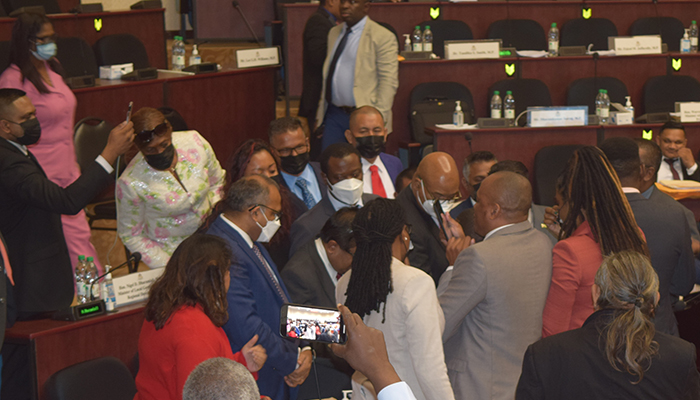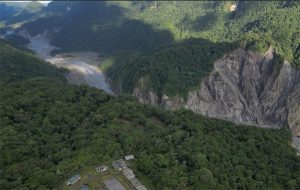-Way cleared for massive abuse, corruption without any jail time –Opposition

his move to have the NRF Bill passed
By Kaieteur News
GEORGETOWN
EnergiesNet.com 12 30 2021
Ignoring mounting criticisms and appeals in the past two weeks to have the Natural Resource Fund Bill 2021 sent to a special select committee for proper consideration and input from the citizenry, the PPP/C Administration used its one-seat majority to ram it through the House Wednesday night, although the Opposition has raised questions about its legality, citing several breaches in the Standing Orders during the chaotic scenes that unf
Members of the political opposition surround the Finance Minister, Dr. Ashni Singh to protest his move to have the NRF Bill passed
Chief Whip for the Parliamentary Opposition, Christopher Jones was first to lead the charge for a stay of the debate as he recalled the criticisms the Bill faced from various quarters since being tabled in the House on December 16, 2021. He said it is only fair that the government sends it to a committee for further consideration as it can have grave implications for the future of all Guyanese.
Speaker of the House, Manzoor Nadir refused to allow Jones’ petition to go through as he instructed him to save his words for when the debate gets underway. He then proceeded to invite Senior Minister with responsibility for Finance, Dr. Ashni Singh to deliver his remarks on the Bill. It was at this point the House erupted into mass confusion. Opposition members started chanting, “No thieving Bill must pass!” as they slammed the bottom of their plastic water bottles to their desks in rhythmic fashion and unison. This was then elevated to members circling the Finance Minister as they continued their wailing with the intention to drown the sound of his voice. Some opposition members even crowed the podium where the Minister stood as they screamed, whistled and howled at him. The Speaker at this point, called for a suspension. Following the short break, it was clear that the government would proceed with the Bill even if there would be no civilized contribution from the political Opposition.
Despite some members throwing themselves into a fit of anger or frustration and one even attempting to make good her escape with the Speaker’s mace, Dr. Singh still pushed through and delivered his presentation on the importance of the Bill. After a notably short speech, the Speaker then rushed the consideration of the entire Bill’s clauses simultaneously and moved for a vote. The government members all gave their stamp of approval and the Bill which was expected to see 21 speakers, was passed with all of its troubling flaws.
Since the Bill was tabled on December 16, Kaieteur News has been at the forefront of highlighting some of the key loopholes that could give way to massive corruption, borrowing frenzies, as well as spending sprees. In the Bill, there are various methods of calculations for the withdrawal of the nation’s oil dollars. But if there is a major natural disaster, the government has the power to override those rules in place and withdraw any amount it deems fit for the said emergency. Importantly, there is no provision that caters for any abuse of this “emergency” mechanism.
When Guyana had pursued the creation of its first NRF legislation back in 2018, it was warned to have clear penalties or the fund could run the risk of failing to serve current and future generations. This advice was provided by the Natural Resource Governance Institute (NRGI), which also cited numerous examples from around the world on how often Natural Resource Funds become easily mismanaged, and the perpetrators go unpunished.
The 1Malaysia Development Berhad (1MDB) fund, established in 2009, has proven to be a major source of alleged corruption and mismanagement. Designed to attract investment into Malaysia by forming joint ventures with foreign firms, 1MDB ended up being in over US$11 billion of debt by 2014. Among its more suspect transactions are a US$1 billion investment in a Saudi oil company in 2009 which has gone missing; funds that were diverted in 2012 from an Abu Dhabi state fund to a firm in the British Virgin Islands (a secrecy jurisdiction); and US$4 billion that has been misappropriated from Malaysian state firms.
Malaysia, the U.S., Switzerland, Singapore and the U.K. are still trying to unravel the web of corruption and money laundering schemes that are related to the fund and robbed current and future generations of their wealth.
The Azerbaijani and Iranian funds are other examples of extra-budgetary funds, which have been used to fund the legacy projects of political parties instead of being prudently saved for future generations. In Azerbaijan, for instance, government authorities have used the State Oil Fund (SOFAZ) to directly finance strategic government projects, such as the railway between Azerbaijan, Georgia and Turkey. These expenditure items were not subject to the same reporting or public procurement requirements as those financed through the regular budget process, nor were they subject to as much parliamentary oversight.
In Iran, that country’s US$40 billion National Development Fund provided loans to private-sector companies, cooperatives and economic enterprises owned by non-governmental institutions through agent banks. While the fund managers did not provide information on the specific investments, news reports revealed where they actually went. Importantly, the executive directly controlled the fund and, therefore, some decisions bypassed normal budgetary and parliamentary procedures.
Taking the foregoing examples into account, among other cases of blatant mismanagement, Guyana was urged to have “clear consequences for malfeasance.” The Bill, in spite of these and other concerns being raised, has been passed with numerous loopholes.
By Kaieteur News
kaieteurnewsonline.com 12 30 2021











